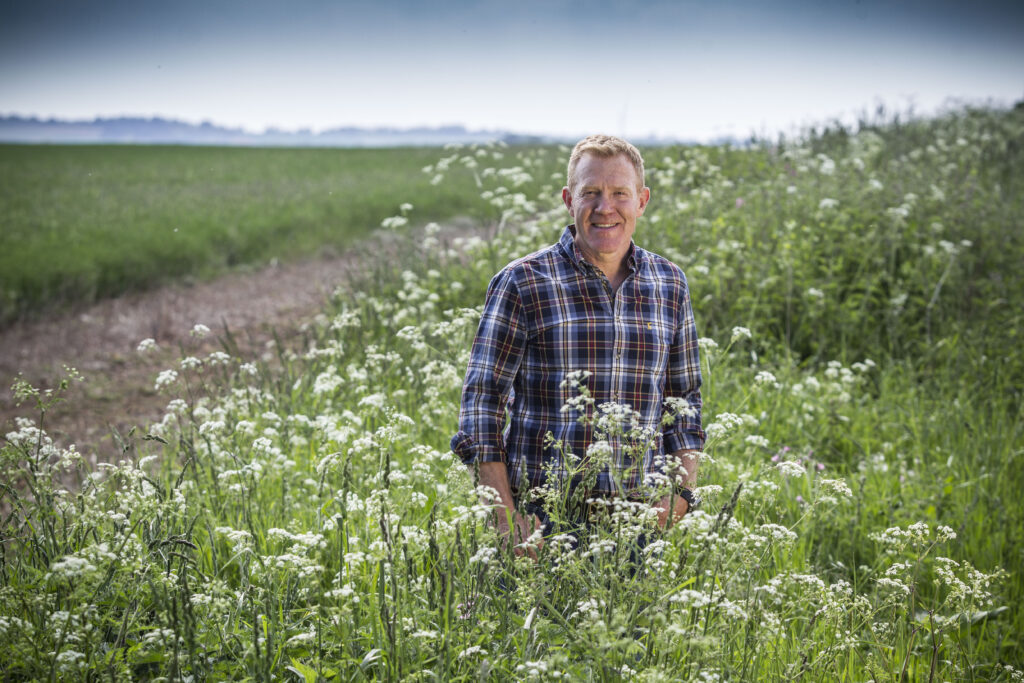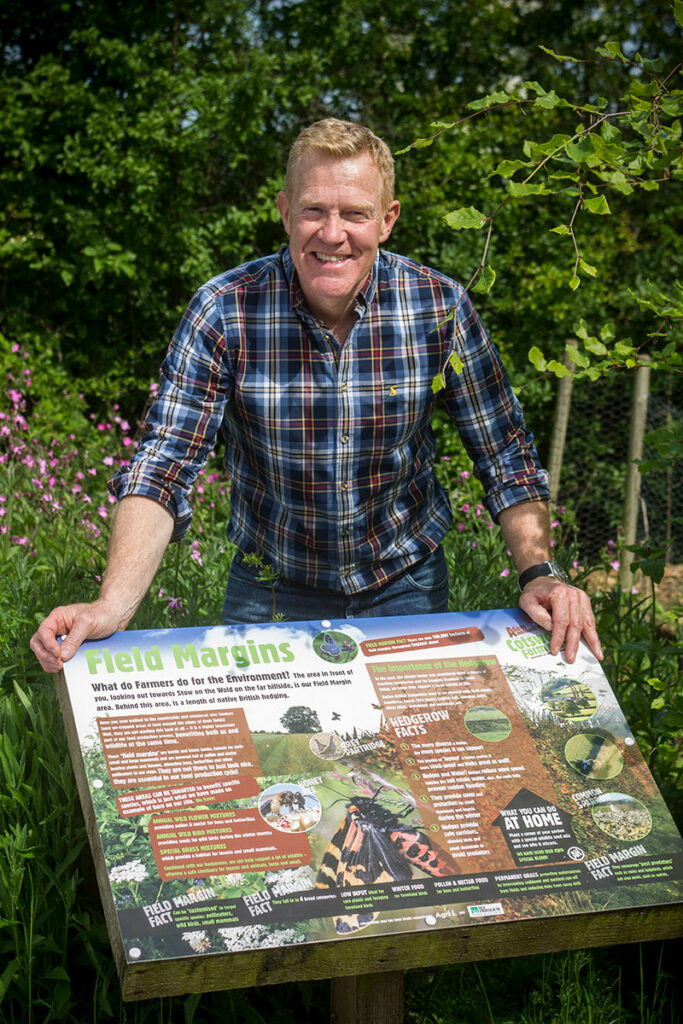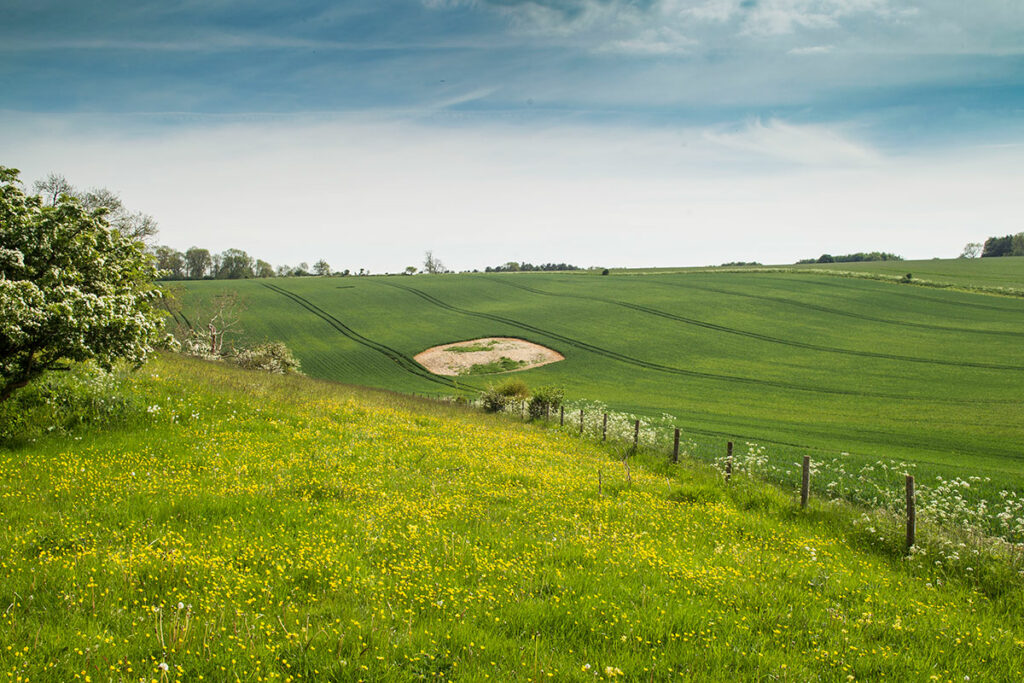Adam Henson believes we must bridge the growing knowledge gap about where our food comes from, if we are to feed the nation and restore the environment

As well as being a regular face of Countryfile for the past 20 years, Adam Henson is a second-generation tenant farmer, and it’s no chocolate box toy farm. He is directly involved in farming over 4,000 acres of arable and sheep in the Cotswolds National Landscape AONB, including a 1,600-acre tenancy, a share farm agreement, and a contract harvesting business. You might think that economies of scale provide financial security, but in normal years the margins are extremely tight. He said: “This year is unusual in that our profits will be high. We bought all our fertilizer early, wheat prices are over £200 per tonne and our yields are above average. But in a normal year, without the war in Ukraine and with BPS reductions, profits are hard to come by and agri-environment schemes will increasingly provide an essential revenue stream.”
Farm facts
- Location: Cotswolds National Landscape AONB
- Type of farming: Sheep and arable
- Acreage: 4,600 acres including 1,600 tenancy, 650-acre share farm agreement and 2,350 acres contracting
- Funding grants: Higher Level Stewardship
- Conservation measures: Beetle banks, wildflower plots, nectar and pollen mixes, wild bird seed mixes, hay meadows and grass margins
Ahead of the curve, Adam has been in Higher Level Stewardship (HLS) for the past 27 years, which has paid for a wide range of conservation measures. In the arable fields, beetle banks and 50 acres of pollen and bird seed mixes provide wildlife corridors. Half his grassland (about 300 acres) is permanent pasture and half of that isn’t cut until the end of the summer, providing acres of habitat for wildflowers and insects. The results are impressive, with plant and bird surveys showing an increase in species and abundance over time.
However, Adam recognises that not all farms are suited to the much-anticipated Environmental Land Management Schemes ELMS, which will be competitive. For those not benefitting from public money, getting a good price for their produce will be essential, if they are expected to restore biodiversity. He said: “It’s all very well having trade agreements with countries like America, but cheaper products from abroad are likely to outcompete British-grown food. The recent Australia deal has been rushed through with very little thought, the NFU are up in arms about it, and it looks like we could end up importing food produced at a lower environmental and welfare standard to our own. In the long term, it could put many of our farmers out of business, which seems a travesty.”

For Adam, addressing the lack of knowledge about food production and its environmental impact is essential if people are to be persuaded to avoid the cheapest option, and his newly expanded Cotswold Farm Park is founded on this principle. It was started in the 1970s by his father Joe, founder of the Rare Breeds Survival Trust, to fund his heritage livestock collection, now an important national resource. Today, after a recent major investment by Adam and his long-term business partner Duncan Andrews, the park welcomes 160,000 visitors a year, with education and entertainment at its core. As well as getting a chance to interact with the rare pigs, sheep and cattle, informative displays around the park explain how modern farm management and conservation can be integrated. He said: “We’ve created a conservation area with different habitats including a pond and give talks about pollination, water, soils, birds and wildflowers. It is absolutely crucial that people of all ages learn about farmland conservation.”

A permissive footpath with information display panels along the way offers the chance to tour the wider farm. At the edge of the park there’s a field where different species of wildflowers grow alongside sunflowers that can be enjoyed and photographed from purpose-built ‘selfie stations’. Visitors can also experience digging their own spuds from the potato patch or picking up a pumpkin during Halloween.
Adam believes real-life, entertaining experiences are key to changing people’s outlook. He said: “My dad always
maintained that people learn when they’re having fun. I’ve seen adults shouting, ‘I’ve got one!’ when they find a potato as if they’ve caught a fish. It’s so important people reconnect with where their food comes from.”
Other educational projects include a non-fiction children’s book, A Year on Adam’s Farm, which aims to give a more honest account of farming, and campaigning work with Happerley Provenance for more transparent food labelling. As part of Happerley’s Feed Me Truth initiative to encourage schools to better understand where their food originates, Adam took some of his sheep into a secondary school in a deprived part of inner-city Birmingham.
He said: “I brought a couple of old Ryelands onto the stage and it was like I’d beamed some aliens into the room – the kids went crazy, they loved it. Some of the children were so used to eating out of packets at home, many had to be taught how to use a knife and fork at school. The impact of diet on learning is huge. In schools where they provide two quality meals a day, attention spans and learning ability increases dramatically. It’s so simple; we need to go back to the mentality of valuing the food on our plates and not wasting anything.
As part of that, I think food and farming should be on the national curriculum. If we can educate young people, the adults of the future, about the pros and cons of various agricultural production systems, their environmental impact, and the benefits of a healthy diet then they will hopefully make the right choices. This will be from a reliable knowledge base rather than clever marketing schemes or social media campaigns.”
When it comes to how to deliver greener agriculture, Adam recognises there is also a knowledge gap in the farming community, but he is confident that farmers will capitalise on their entrepreneurial spirit. On his own farm he is growing 50 acres of wildflowers with a view to harvesting the seed, which promises to increase in value as demand for traditional meadows grows. He also has a partnership with a bee farmer who has a free area to keep his hives and teach courses in exchange for honey sold in the Cotswold Farm Park gift shop.
He said: “When I went to agricultural college all those years ago, we were taught how to grow food – I was never told about the environment. In those days, people like Prince Charles and my dad, who were speaking out about conservation, were not taken seriously. But the green movement is no longer considered as hippies with sandals. These days it’s the suits who are recognising it’s what the public wants. There’s a responsibility to be recognised but also money to be made, and farmers are an enterprising bunch.”
However creative and efficient British farmers are, there’s no doubt that when subsidies end in 2027, agri-environment schemes will play a crucial role in reaching environmental targets for farming, with guaranteed income providing crucial reliability in an otherwise risk-laden business. As a veteran of such agreements, Adam wants to see a more farmer-led, flexible approach. He said: “If something isn’t working, we should be allowed to change it. For example, when we were paid for arable reversion to old Cotswold grassland, it didn’t really take; it should have been done with a multi-species mix.”

This new approach would be more results-based, requiring greater monitoring and research into practical solutions by organisations like the Game & Wildlife Conservation Trust (GWCT), whose science is behind the majority of arable agri-environment measures currently available. Adam said: “I’m a fan and a member of GWCT and we need independent bodies like them shaping the way forward. We’ve done too many things on a whim in the past – we need to look at the science.”
Looking ahead, Adam is keen to do more to green his operation, but he believes sustainability must start with the bottom line. He said: “What concerns me is that we are going to go down an environmentally driven agenda, at the same time food security has come to the top of the tree.
There needs to be a balance between precision farming and environmental land use. As a business we are going to continue to farm conventionally but consider our environmental impact more. When I look at what we are doing with monoculture cropping, chucking on fertilizer and pesticides, are we doing the right thing? Probably not. No doubt we could do more, but our rent is non-negotiable and I’ve got to pay the bills. People think sustainability starts with the environment, but it doesn’t. Looking after your people, producing food, and nurturing the environment – if you don’t make money, you can’t do any of that.”
Please help our team continue their vital conservation research by giving what you can. All payment cards, PayPal, Apple Pay and Google Pay accepted.
